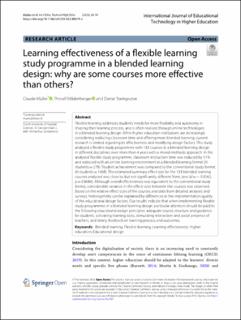Please use this identifier to cite or link to this item:
https://doi.org/10.21256/zhaw-27763| Publication type: | Article in scientific journal |
| Type of review: | Peer review (publication) |
| Title: | Learning effectiveness of a flexible learning study programme in a blended learning design : why are some courses more effective than others? |
| Authors: | Müller Werder, Claude Mildenberger, Thoralf Steingruber, Daniel |
| et. al: | No |
| DOI: | 10.1186/s41239-022-00379-x 10.21256/zhaw-27763 |
| Published in: | International Journal of Educational Technology in Higher Education |
| Volume(Issue): | 20 |
| Issue: | 10 |
| Issue Date: | 2023 |
| Publisher / Ed. Institution: | Springer |
| ISSN: | 2365-9440 |
| Language: | English |
| Subjects: | Blended learning; Educational design; Flexible learning; Higher education; Learning effectiveness |
| Subject (DDC): | 378: Higher education |
| Abstract: | Flexible learning addresses students' needs for more flexibility and autonomy in shaping their learning process, and is often realised through online technologies in a blended learning design. While higher education institutions are increasingly considering replacing classroom time and offering more blended learning, current research is limited regarding its effectiveness and modifying design factors. This study analysed a flexible study programme with 133 courses in a blended learning design in different disciplines over more than 4 years with a mixed-methods approach. In the analysed flexible study programme, classroom instruction time was reduced by 51% and replaced with an online learning environment in a blended learning format (N students = 278). Student achievement was compared to the conventional study format (N students = 1068). The estimated summary effect size for the 133 blended learning courses analysed was close to, but not significantly different from, zero (d = - 0.0562, p = 0.3684). Although overall effectiveness was equivalent to the conventional study format, considerable variance in the effect sizes between the courses was observed. Based on the relative effect sizes of the courses and data from detailed analyses and surveys, heterogeneity can be explained by differences in the implementation quality of the educational design factors. Our results indicate that when implementing flexible study programmes in a blended learning design, particular attention should be paid to the following educational design principles: adequate course structure and guidance for students, activating learning tasks, stimulating interaction and social presence of teachers, and timely feedback on learning process and outcomes. |
| URI: | https://digitalcollection.zhaw.ch/handle/11475/27763 |
| Fulltext version: | Published version |
| License (according to publishing contract): | CC BY 4.0: Attribution 4.0 International |
| Departement: | School of Engineering School of Management and Law |
| Organisational Unit: | Institute of Data Analysis and Process Design (IDP) Center for Innovative Teaching and Learning (ZID) |
| Appears in collections: | Publikationen School of Management and Law |
Files in This Item:
| File | Description | Size | Format | |
|---|---|---|---|---|
| 2023_Mueller-etal_Learning-effectiveness-flexible-learning-study-program.pdf | 1.5 MB | Adobe PDF |  View/Open |
Show full item record
Müller Werder, C., Mildenberger, T., & Steingruber, D. (2023). Learning effectiveness of a flexible learning study programme in a blended learning design : why are some courses more effective than others? International Journal of Educational Technology in Higher Education, 20(10). https://doi.org/10.1186/s41239-022-00379-x
Müller Werder, C., Mildenberger, T. and Steingruber, D. (2023) ‘Learning effectiveness of a flexible learning study programme in a blended learning design : why are some courses more effective than others?’, International Journal of Educational Technology in Higher Education, 20(10). Available at: https://doi.org/10.1186/s41239-022-00379-x.
C. Müller Werder, T. Mildenberger, and D. Steingruber, “Learning effectiveness of a flexible learning study programme in a blended learning design : why are some courses more effective than others?,” International Journal of Educational Technology in Higher Education, vol. 20, no. 10, 2023, doi: 10.1186/s41239-022-00379-x.
MÜLLER WERDER, Claude, Thoralf MILDENBERGER und Daniel STEINGRUBER, 2023. Learning effectiveness of a flexible learning study programme in a blended learning design : why are some courses more effective than others? International Journal of Educational Technology in Higher Education. 2023. Bd. 20, Nr. 10. DOI 10.1186/s41239-022-00379-x
Müller Werder, Claude, Thoralf Mildenberger, and Daniel Steingruber. 2023. “Learning Effectiveness of a Flexible Learning Study Programme in a Blended Learning Design : Why Are Some Courses More Effective than Others?” International Journal of Educational Technology in Higher Education 20 (10). https://doi.org/10.1186/s41239-022-00379-x.
Müller Werder, Claude, et al. “Learning Effectiveness of a Flexible Learning Study Programme in a Blended Learning Design : Why Are Some Courses More Effective than Others?” International Journal of Educational Technology in Higher Education, vol. 20, no. 10, 2023, https://doi.org/10.1186/s41239-022-00379-x.
Items in DSpace are protected by copyright, with all rights reserved, unless otherwise indicated.